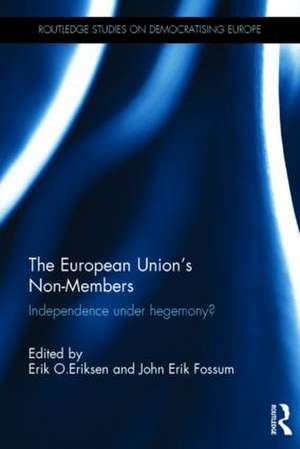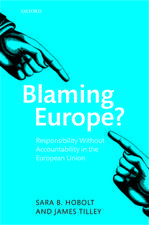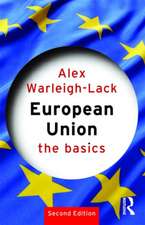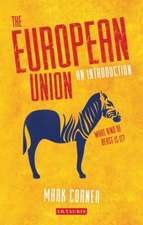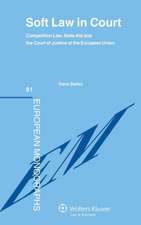The European Union's Non-Members: Independence under hegemony?: Routledge Studies on Democratising Europe
Editat de Erik Oddvar Eriksen, John Erik Fossumen Limba Engleză Paperback – 29 mai 2015
This book asks whether qualifying states who have eschewed EU membership experience negative effects on their legal and political self-governing abilities, or whether they manage their independence with few such effects. It explores the idea that the closer the affiliation a non-member state has with the EU, the more susceptible to hegemony the relationship appears to be. In addition, the book provides an overview of the total range of agreements the EU has with non-member states.
This text will be of key interest to scholars and students of in EU/European studies, Scandinavian studies, European and comparative politics, international relations, and democratization studies.
| Toate formatele și edițiile | Preț | Express |
|---|---|---|
| Paperback (1) | 306.42 lei 6-8 săpt. | |
| Taylor & Francis – 29 mai 2015 | 306.42 lei 6-8 săpt. | |
| Hardback (1) | 701.64 lei 6-8 săpt. | |
| Taylor & Francis – 3 iun 2015 | 701.64 lei 6-8 săpt. |
Preț: 306.42 lei
Nou
Puncte Express: 460
Preț estimativ în valută:
58.64€ • 60.100$ • 48.41£
58.64€ • 60.100$ • 48.41£
Carte tipărită la comandă
Livrare economică 15-29 aprilie
Preluare comenzi: 021 569.72.76
Specificații
ISBN-13: 9781138922457
ISBN-10: 1138922455
Pagini: 264
Ilustrații: 4
Dimensiuni: 156 x 234 x 14 mm
Greutate: 0.38 kg
Ediția:1
Editura: Taylor & Francis
Colecția Routledge
Seria Routledge Studies on Democratising Europe
Locul publicării:Oxford, United Kingdom
ISBN-10: 1138922455
Pagini: 264
Ilustrații: 4
Dimensiuni: 156 x 234 x 14 mm
Greutate: 0.38 kg
Ediția:1
Editura: Taylor & Francis
Colecția Routledge
Seria Routledge Studies on Democratising Europe
Locul publicării:Oxford, United Kingdom
Public țintă
PostgraduateCuprins
1 Introduction – asymmetry and the problem of dominance Erik O. Eriksen and John Erik Fossum Part One: Forms of association without membership 2 The EU’s different neighbourhood models Sieglinde Gstöhl 3 The Swiss Way – the Nature of Switzerland’s Relationship to the EU Sandra Lavenex and René Schwok 4 Switzerland – bilateralism’s polarizing consequences in a very particular/ist democracy Joachim Blatter Part Two: Welcomed, inside, but still unwilling – two EEA countries assessed 5 Despoiling Norwegian democracy Erik O. Eriksen 6 The EEA and the case-law of the ECJ: Incorporation without participation? Halvard Haukeland Fredriksen 7 Iceland – A reluctant European? Baldur Thórhallsson 8 Norway’s Constitutional Acrobatics under the EEA Agreement Eirik Holmøyvik 9 Representation under hegemony? On Norway’s relationship to the EU John Erik Fossum 10 National administrative sovereignty – under pressure Morten Egeberg and Jarle Trondal 11 Reinforcing Executive dominance. Norway and EU’s foreign and security policy Helene Sjursen Part Three: Sovereignty Under Hegemony12 The United Kingdom, A Once and Future? Non-Member State Chris Lord 13 Hegemony by association Erik O. Eriksen and John Erik Fossum
Descriere
This book asks whether qualifying states who have eschewed EU membership experience negative effects on their legal and political self-governing abilities, or whether they manage their independence with few such effects. It explores the idea that the closer the affiliation a non-member state has with the EU, the more susceptible to hegemony the relationship appears to be. In addition, the book provides an overview of the total range of agreements the EU has with non-member states.
